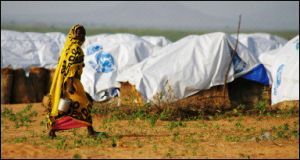Sudan claims foreign elements in Darfur crisis
KUALA LUMPUR, Sep 24, 2004 (Bernama) — A top official of Sudan’s ruling party Friday claimed that foreign elements are involved in the ongoing problem in the African country’s western region of Darfur.
 Mahdi Ibrahim Mohamed, Deputy Secretary General of the ruling National Congress of Sudan, said that foreign elements were aiding the rebels in Darfur against the Sudanese government and this had not helped in finding a peaceful solution to the crisis.
Mahdi Ibrahim Mohamed, Deputy Secretary General of the ruling National Congress of Sudan, said that foreign elements were aiding the rebels in Darfur against the Sudanese government and this had not helped in finding a peaceful solution to the crisis.
“Foreign elements… supporting, financing and arming. We have no doubt such elements (exist),” he said in an interview at Wisma Bernama here.
Mahdi, who is here as a guest to attend the 55th Umno General Assembly, declined to go into details of those involved.
He said: “Many names of countries, of NGOs (Non-Governmental Organisations), some human rights groups and individuals who are in full complicity with the rebels… rather than helping to resolve the situation, they encourage escalation.”
Describing the situation in Darfur as a “human catastrophe”, Mahdi said that there are some 1.2 million people in the internally displaced camps and another 150,000 in refugee camps. The Darfur region which comprises three states has some five million population.
The Sudanese government has been accused of backing the Janjaweed Arab militias who attacked African villagers in Darfur but Khartoum denied this, calling the militias outlaws.
The rebels, comprising several different groups, have demanded the disarmament of the militias and accused the government of arming the militias.
Mahdi also slammed those supporting the rebels, saying that they were practising double standards and hypocrisy on the issue of terrorism.
He said: “The unfortunate side of this catastrophe is that some of these countries which came to Sudan, rather than holding the rebels responsible for starting this violence, they embrace them and they stood silent about the catastrophe they committed.
“Rather than asking all to disarm, including the rebels, they asked to disarm the militias, excluding the rebels. Rather then calling the rebels terrorists, they embrace them and call them freedom fighters.”
Mahdi also stressed that the Sudanese government did not condone violence or armed attacks by the militias and it is open for dialogue and negotiations to end the crisis.
He also said that the terms repeatedly used by the foreign media such as “genocide” and “ethnic cleansing” to describe the situation in Darfur paints a negative picture about Sudan.
“The negative coverage of the media of what is happening… rather than focusing on the country and how people are living, they only focus on the camps… and, in camps, they pick individuals who are extremely ill or have lost weight. They only focus on this very negative aspect but the whole county is missed and submerged,” he said.
According to Mahdi, in the past, Sudan had been unfairly accused of harbouring terrorists.
“But there were no incidents of bombing or abductions of any Europeans during the past 15 years (in Sudan)… yet they branded us as harbouring terrorists,” he said.
Mahdi said the Darfur crisis could also be linked to shortage of water resources and drought in the past 10 years which resulted in problems between farmers and herdsmen and tribal conflicts as there is some 50 tribal groups in Darfur alone.
He noted that Sudan, the largest African country bordering nine other countries, is very much a multi-ethnic society with 550 tribal groups speaking more than 400 dialects.
“Certainly, we draw a lesson from this (the Darfur crisis) and will be more ready to face such situation in future… our intervention (to control the situation) came a little bit late but the situation is (now) under control,” he said.
